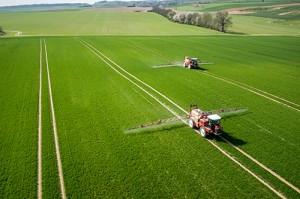 The world population is expected to exceed nine billion people by 2050 from an estimated 7.3 billion today, according to various sources. How will we be able to feed all of those extra people? Water is already in short supply so it will be difficult to create additional arable land. Forests around the world are being plowed under to meet this growing need, but in the process we are changing the balance of fragile ecosystems. A National Geographic author asks: How can the world double the availability of food while simultaneously cutting the environmental harm caused by agriculture?
The world population is expected to exceed nine billion people by 2050 from an estimated 7.3 billion today, according to various sources. How will we be able to feed all of those extra people? Water is already in short supply so it will be difficult to create additional arable land. Forests around the world are being plowed under to meet this growing need, but in the process we are changing the balance of fragile ecosystems. A National Geographic author asks: How can the world double the availability of food while simultaneously cutting the environmental harm caused by agriculture?
The answer may be farms capable of increasing food production through technology while also reducing their environmental impact.
So Many Cows
Three Mile Canyon Farms in rural Boardman, OR combines a dairy operation with cropland dedicated to potatoes, onions, carrots, and various organic crops. The sheer size of this operation sets it apart from other private or even corporate farms. The entire ranch covers 93,000 acres and houses 24,000 cows that produce 165,000 gallons of milk each day. There are milk trucks lined up 24 hours a day to haul the milk to a nearby cheese processing plant. This farm is set up to be a closed loop system in terms of waste management. The manure is used to fertilize the potatoes and the potato skins and culls from the processing plant are used as feed for the cows. Any excess methane from the waste collection is used to create electricity for the operation. Automated milking machines collect the milk, which is how they are able to run such a large operation. The water for the potatoes and other crops comes from the nearby Columbia river but is used judiciously by employing computerized hydrology maps, which I wrote about in a recent blog. The farm has set aside 23,000 acres as a preserve for wildlife and endangered plant species. They are trying to reach a balance of feeding an increasing population while still being good stewards of the land and environment.
The Science of Crop Production
Another technology that is available is the controversial genetically modified organism or GMO. These modified seeds can achieve increased yield through built in drought or pesticide resistance. The manufacturer often controls the seed so it may not be widely available or affordable for emerging nations. The controversy surrounding GMO is that there are many unknowns. How will the genetic modifications affect the health of the consumer in this generation or in generations to come? How do we keep GMO seeds in one field from cross-pollinating with non-GMO seeds in another field? Will crops from GMO seeds have the same nutritional value as their unaltered counterparts? As with any new technology, there are initial barriers, but GMO is one potential solution for feeding a growing population.
Low Tech Solutions
In a Nature Journal article earlier this year the authors compared yields between organic crops and those raised with chemical fertilizers and pesticides. Studies show a consistently lower yield for organic crops but when grown in drought conditions, the organic crops came out on top. This is due to the fact that non-chemically treated soils better retain moisture. Organic farming is potentially one piece of the puzzle for feeding a growing population.
Thoughts
Eighteenth century cleric and philosopher Thomas Malthus suggested in his book “An Essay on the Principle of Population” that prosperity would bring about population growth but that growth cycle was not sustainable and would eventually end in famine and starvation. It remains to be seen whether technology will help us forestall his predictions or whether his ideas are no longer valid. It is certain that we will need to produce more food for a growing population and technology is one way of achieving that. Let me know your thoughts.
Kelly Brown is an IT professional and assistant professor of practice for the UO Applied Information Management Master’s Degree Program. He writes about IT and business topics that keep him up at night.

